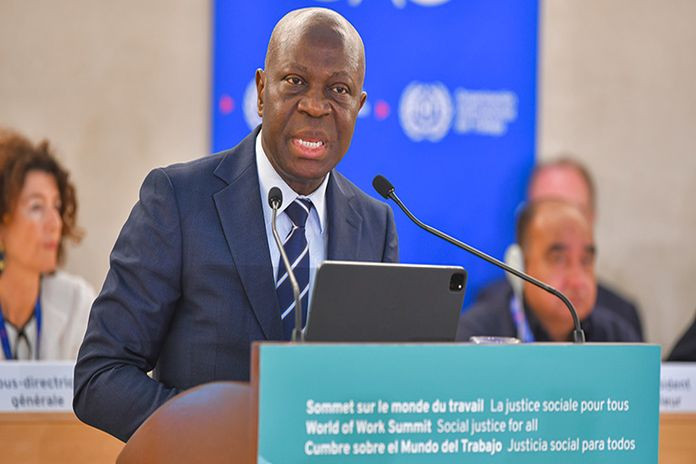GENEVA, Switzerland, (ILO News) – The director-general of the International Labour Organization (ILO), Gilbert F. Houngbo, called upon countries to, “bend the arc of history in favour of social justice” as he addressed a two-day World of Work Summit in Geneva, Switzerland.
“Greater social justice gives us a cause to rally round. But is much more than that. It is a driving force that can steer us towards a more equitable and sustainable future. As such, it must become our guiding principle, for both policies and action,” said Houngbo.
“Social justice is essential to make our societies and economies more cohesive, productive and peaceful. It is essential if we are to restore confidence in our institutions and provide proof of effective multilateralism that meets people’s expectations,” he added. “Let us seize this opportunity and take this chance to show our collective commitment and determination. And let us not be afraid to be bold in our approach.”
The Summit, which took place on 14 and 15 June, during the 111th International Labour Conference, brought together 16 Heads of State and Government, as well as high-level representatives from the United Nations, other international organizations, and employers’ and workers’ organizations.
Under the theme of “Social Justice for All”, the summit discussed various issues relating to social justice including the proposal to forge a Global Coalition for Social Justice – a multi-lateral initiative that was welcomed by the ILO’s governing body at its 347th Session in March 2023.
“The Coalition will focus on driving real improvements in daily lives, in particular for our most vulnerable fellow citizens, including the young people in desperate situations who are driven to migration in dangerous conditions. It will seek to catalyse social investment, generate more funding for grassroots interventions, and rally domestic and international support for greater social justice,” said the ILO director-general.
The forum also addressed how to improve coordination and policy coherence to increase the scale and impact of actions towards social justice across the multilateral system. It provided an opportunity for the participants to share their vision of, and priorities for, social justice and to showcase the actions they are taking, and their commitments to advance social justice.
In addition to the individual leaders’ addresses the agenda included four high-level panels which focused on; addressing inequalities, informality and facilitating inclusion; fostering equal opportunities and productive employment for all through education and lifelong learning; ensuring jobs and social protection for a just transition; and advancing human and labour rights at the same time as trade, employment and sustainable development.





